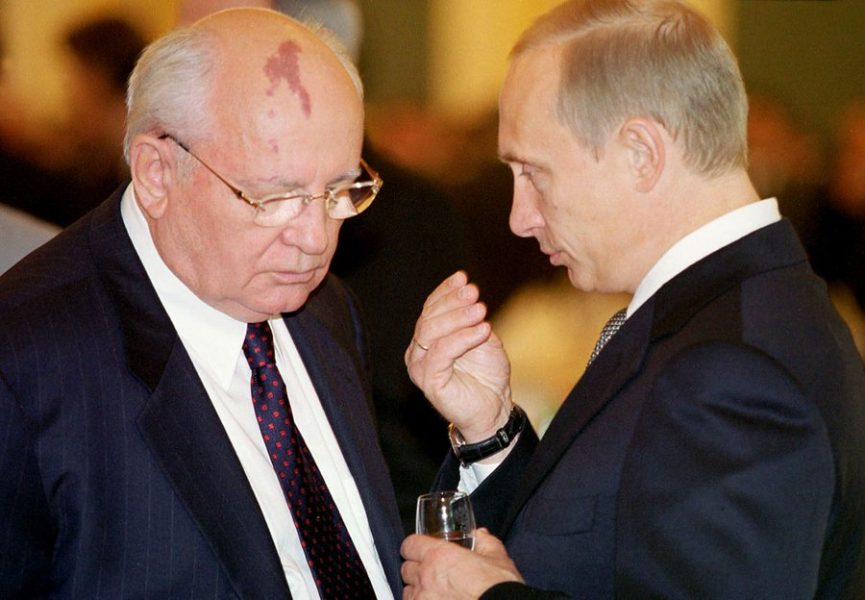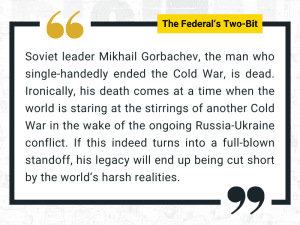
Gorbachev meant democracy, but his inheritors prefer dictatorship
As President Vladimir Putin consolidates his hold over Russia, through means fair and foul, the democracy that Mikhail Gorbachev envisioned has been relegated to the dustbin

In the last few years, little was heard of Mikhail Gorbachev, the man who triggered a series of cataclysmic events that lead to the fall of the mighty Soviet Union.
As President Vladimir Putin consolidates his hold over Russia, through means fair and foul, the democracy that Gorbachev envisioned has been relegated to the dustbin. In its place has emerged a Russia that is autocratic, but rising again as a power big enough to challenge the sole remaining super-power – the United States.

Over the last two decades Putin has asserted himself within Russia while simultaneously reminding the world that his nation has not forgotten its imperial past – first by intervening in the Syrian civil war on the side of another dictator Bashar al-Assad in 2014. Putin’s entry decisively turned the balance of tide in favour of al-Assad, beat back the rebels supported by the US-led West and ensured status quo in Syria.
Amidst this, Gorbachev is today back in the news in his death. During the last decade, Gorbachev has kept a low-profile except for an occasional statement through the foundation he established or through his close friends. Recently, reports quoted a close friend of Gorbachev as saying he was “dismayed that his life’s work had been destroyed by Putin”.
From this and earlier statements it is clear that Gorbachev was upset over the trajectory of post-Soviet Russia. His vision of a liberal, democratic Russia had been dashed. Worse, Gorbachev has had the unique experience of seeing his legacy destroyed in his own lifetime. Particularly painful has been the ongoing conflict with Ukraine which was very much part of the Soviet Union he once presided over.
Also read: ‘Maverick’ Mikhail Gorbachev, who steered Soviet reforms, dead at 91
Though the Soviet disintegration surprised the US and the rest of the world, the event has now been normalised, and even taken for granted by the current generation. From various accounts of people within Russia and the rest of the former Soviet states, there is however a tinge of regret over the breakup of their once solid nation.
A former colleague, a journalist from Azerbaijan, was a few years ago explaining in detail to this writer how life was in her country after the breakup. While it was all well that there was more openness in society and in government, the country was for the first time seeing the downsides of not being part of the Soviet behemoth. She pointed out that there was sadness and nostalgia among many in her family about the life they had led when they were part of the Soviet Union. Not all, but many shared this feeling, she said.
Gorbachev himself, when he floated the idea of glasnost (openness) and perestroika (restructuring) after coming to power in 1985, did not expect the Soviet Union to disintegrate. From various accounts, he was a personality unlike his hard-nosed predecessors in the Communist Party. As his biographer William Taubman puts it, he was difficult to understand.
Having taken over as the party general secretary and president of the country at a relatively young age of 54, Gorbachev attempted to loosen the control of the state over the economy and politics and bring in multi-party democracy. But he does not appear to have thought through the manner in which this would be implemented.
The other negative was that it was largely his individual vision. Even if it had been discussed within the party, given that the position of General Secretary was powerful, there was hardly an attempt to evolve a collective method to carry out this huge experiment. It would appear, in hindsight, that Gorbachev who was actually setting out to alter the fundamentals of Soviet politics, economy and by extension, society, ended up shaking the very foundations of the country.
If anyone anywhere in the world had even suggested in 1985, when he took over power, that Gorbachev’s reformist policies would result in the end of the Soviet Union, they would have been ignored or ridiculed. But that is exactly what happened six years later, on December 25, 1991. A saving grace was the disintegration was largely peaceful, thanks to a unique clause in the Soviet Constitution of 1977 which gave the right of constituent republics to secede from the Union.
The other reason for the absence of violence, seen in other countries that broke up, was because of Gorbachev and his erstwhile colleague Boris Yeltsin who decreed that the existing boundaries of the republics would be the new international boundaries.
As an epochal figure, Gorbachev will be remembered for his noble intentions but not for his administrative skills. For, he presided over the demise of a Communist state that had provided its people with security of jobs and food, without replacing the dark side of repression and authoritarian rule by a resilient working model of democracy.
Also read: It’s clear now: Russia-Ukraine conflict heralds dawn of Cold War 2.0
Economically too, the chaos that followed the break up was exploited by vested interests to grab the vast natural resources, including oil, resulting in the emergence of oligarchs who today control the narrative in Russia and other post-Soviet states.
Other than Lithuania, Latvia and Estonia which comprise one percent of the former Soviet Union and are democracies, the rest have turned into nations with various types of dictatorships. Russia, which went up the democracy index in the early years of the post-Soviet era, has gradually slipped into authoritarianism.
There are several theories as to what Gorbachev was up to when he set the ball rolling for the opening up of the Soviet Union. Either he was do-gooder who wanted democracy in his country or an individual who was subtly influenced by the West to bring in changes to weaken the nation.
There are conspiracy theories as well, including that he was an “agent” of the West brought in to bring down the Soviet superpower. Responding to this Gorbachev himself, was quoted by reports as having told the Supreme Soviet “this is a crude attempt to throw some shadows”.
But, seeing the manner in which events have unfolded since the advent of Gorbachev, history will either be exceedingly kind to him or paint him as an abominable villain – depending on who is writing it: the West or the East.


